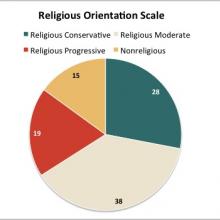religious progressives
Since winning the election with strong support from conservative evangelical voters, President Trump has invited their leaders to the White House, and banned government funding for groups that support or perform abortions overseas.
But he has yet to move on one item that many of them care about.
No one has been named to direct the Office of Faith-based and Neighborhood Partnerships, which, since 2001, has linked government with a broad range of religious groups.
There is a lopsided divide in America about what it means to be a religious person, with a majority believing that it’s about acting morally but a strong minority equating it with faith.
Nearly six out of 10 Americans (59 percent) say that being a religious person “is primarily about living a good life and doing the right thing,” as opposed to the more than one-third (36 percent) who hold that being religious “is primarily about having faith and the right beliefs.”
The findings, released Thursday, are part of a report by the Public Religion Research Institute and the Brookings Institution that aims to paint a more nuanced picture of the American religious landscape, and the religious left in particular.


